Business Law: Comprehensive Analysis of the English Legal System
VerifiedAdded on 2024/05/16
|21
|4960
|444
Report
AI Summary
This report provides a comprehensive overview of the English Legal System, focusing on its sources, including international law, and the structure of the UK courts. It discusses the uncodified nature of the UK constitution, the separation of powers, and the legislative process. The report also examines the role of judicial review and the application of international law within the UK legal framework. Furthermore, it highlights the significance of company law, employment law, and contract law in the context of business operations. The report concludes by touching upon emergency powers, human rights protection, and the amendment process within the UK's legal system. Find more solved assignments on Desklib.
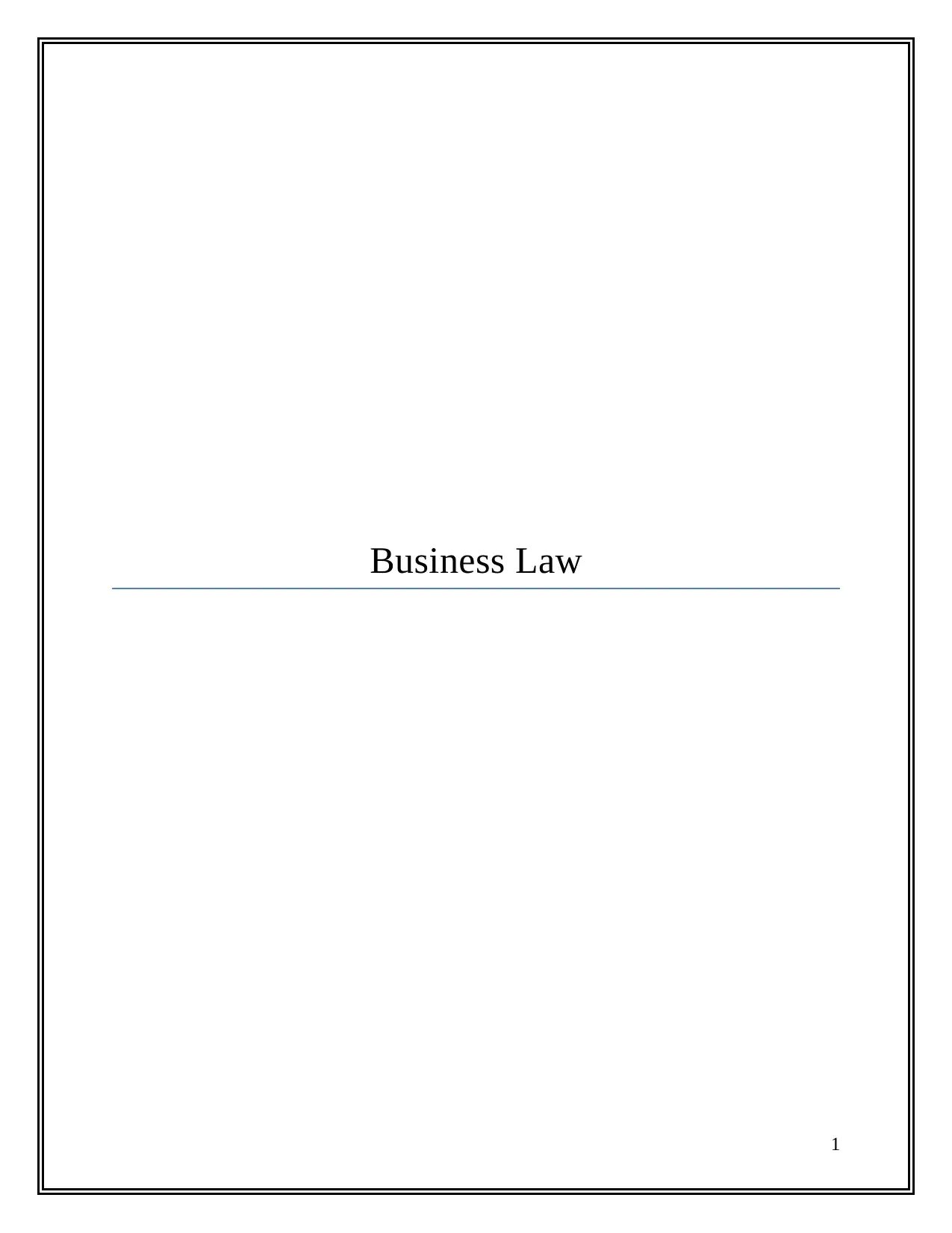
Business Law
1
1
Paraphrase This Document
Need a fresh take? Get an instant paraphrase of this document with our AI Paraphraser
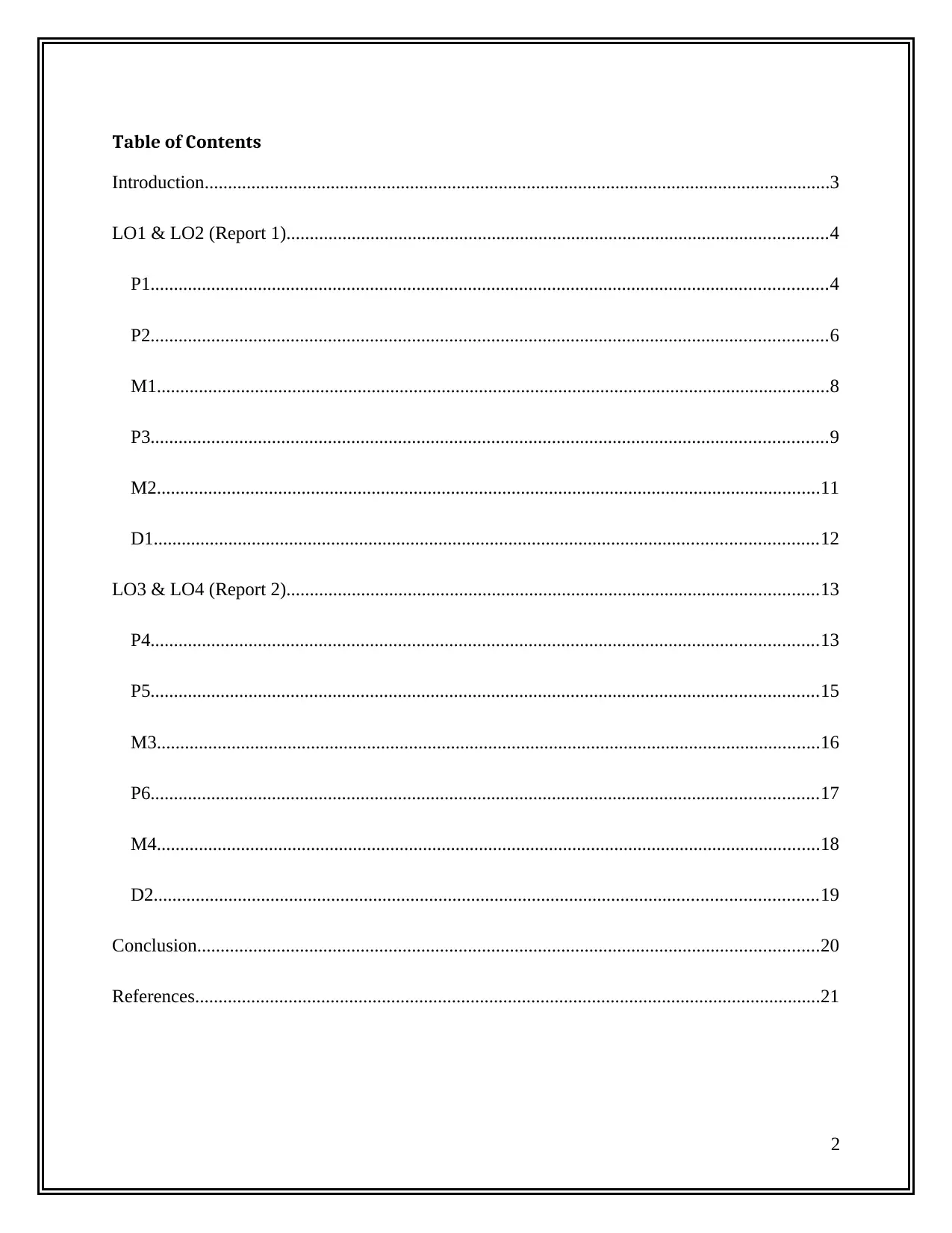
Table of Contents
Introduction......................................................................................................................................3
LO1 & LO2 (Report 1)....................................................................................................................4
P1.................................................................................................................................................4
P2.................................................................................................................................................6
M1................................................................................................................................................8
P3.................................................................................................................................................9
M2..............................................................................................................................................11
D1..............................................................................................................................................12
LO3 & LO4 (Report 2)..................................................................................................................13
P4...............................................................................................................................................13
P5...............................................................................................................................................15
M3..............................................................................................................................................16
P6...............................................................................................................................................17
M4..............................................................................................................................................18
D2..............................................................................................................................................19
Conclusion.....................................................................................................................................20
References......................................................................................................................................21
2
Introduction......................................................................................................................................3
LO1 & LO2 (Report 1)....................................................................................................................4
P1.................................................................................................................................................4
P2.................................................................................................................................................6
M1................................................................................................................................................8
P3.................................................................................................................................................9
M2..............................................................................................................................................11
D1..............................................................................................................................................12
LO3 & LO4 (Report 2)..................................................................................................................13
P4...............................................................................................................................................13
P5...............................................................................................................................................15
M3..............................................................................................................................................16
P6...............................................................................................................................................17
M4..............................................................................................................................................18
D2..............................................................................................................................................19
Conclusion.....................................................................................................................................20
References......................................................................................................................................21
2
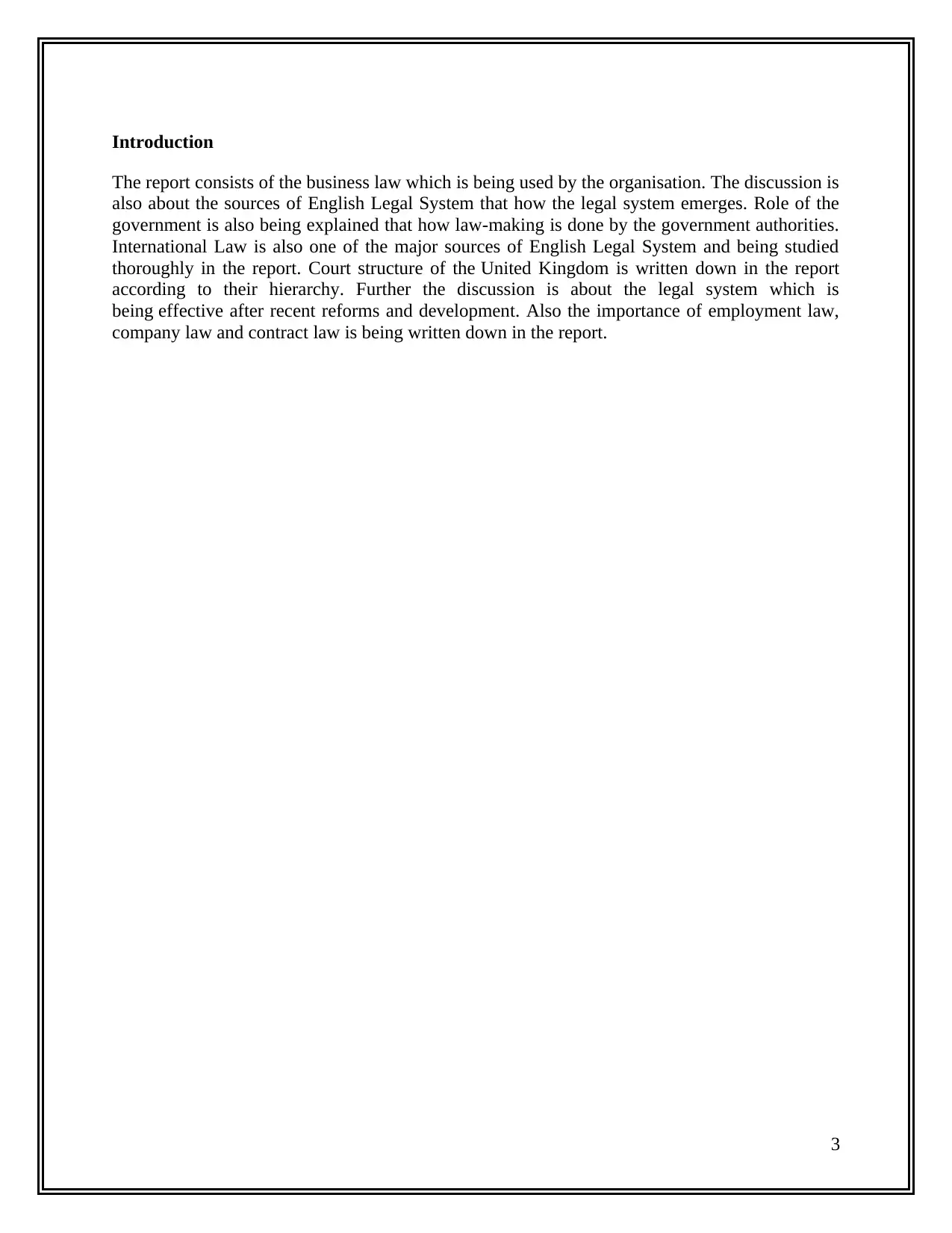
Introduction
The report consists of the business law which is being used by the organisation. The discussion is
also about the sources of English Legal System that how the legal system emerges. Role of the
government is also being explained that how law-making is done by the government authorities.
International Law is also one of the major sources of English Legal System and being studied
thoroughly in the report. Court structure of the United Kingdom is written down in the report
according to their hierarchy. Further the discussion is about the legal system which is
being effective after recent reforms and development. Also the importance of employment law,
company law and contract law is being written down in the report.
3
The report consists of the business law which is being used by the organisation. The discussion is
also about the sources of English Legal System that how the legal system emerges. Role of the
government is also being explained that how law-making is done by the government authorities.
International Law is also one of the major sources of English Legal System and being studied
thoroughly in the report. Court structure of the United Kingdom is written down in the report
according to their hierarchy. Further the discussion is about the legal system which is
being effective after recent reforms and development. Also the importance of employment law,
company law and contract law is being written down in the report.
3
⊘ This is a preview!⊘
Do you want full access?
Subscribe today to unlock all pages.

Trusted by 1+ million students worldwide
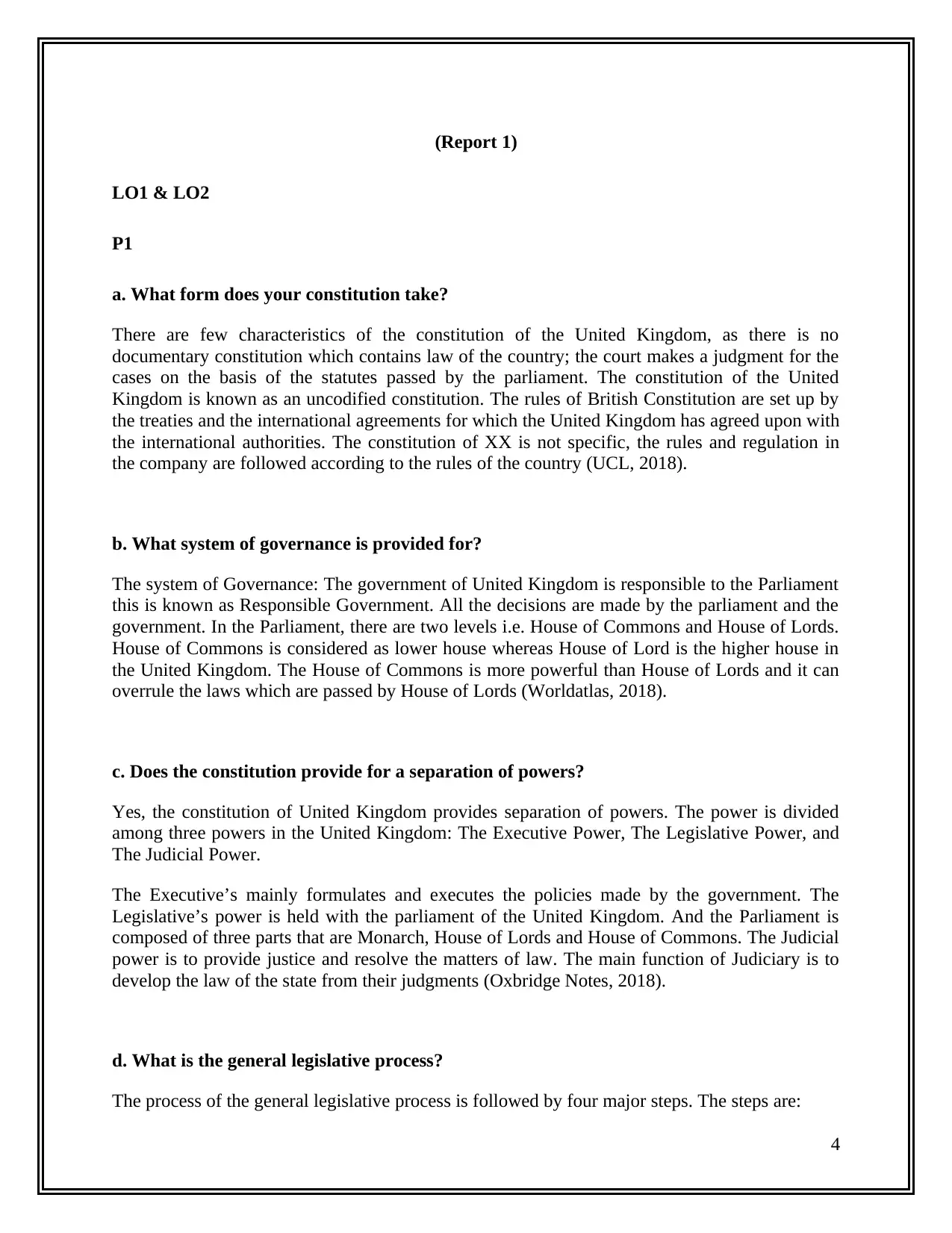
(Report 1)
LO1 & LO2
P1
a. What form does your constitution take?
There are few characteristics of the constitution of the United Kingdom, as there is no
documentary constitution which contains law of the country; the court makes a judgment for the
cases on the basis of the statutes passed by the parliament. The constitution of the United
Kingdom is known as an uncodified constitution. The rules of British Constitution are set up by
the treaties and the international agreements for which the United Kingdom has agreed upon with
the international authorities. The constitution of XX is not specific, the rules and regulation in
the company are followed according to the rules of the country (UCL, 2018).
b. What system of governance is provided for?
The system of Governance: The government of United Kingdom is responsible to the Parliament
this is known as Responsible Government. All the decisions are made by the parliament and the
government. In the Parliament, there are two levels i.e. House of Commons and House of Lords.
House of Commons is considered as lower house whereas House of Lord is the higher house in
the United Kingdom. The House of Commons is more powerful than House of Lords and it can
overrule the laws which are passed by House of Lords (Worldatlas, 2018).
c. Does the constitution provide for a separation of powers?
Yes, the constitution of United Kingdom provides separation of powers. The power is divided
among three powers in the United Kingdom: The Executive Power, The Legislative Power, and
The Judicial Power.
The Executive’s mainly formulates and executes the policies made by the government. The
Legislative’s power is held with the parliament of the United Kingdom. And the Parliament is
composed of three parts that are Monarch, House of Lords and House of Commons. The Judicial
power is to provide justice and resolve the matters of law. The main function of Judiciary is to
develop the law of the state from their judgments (Oxbridge Notes, 2018).
d. What is the general legislative process?
The process of the general legislative process is followed by four major steps. The steps are:
4
LO1 & LO2
P1
a. What form does your constitution take?
There are few characteristics of the constitution of the United Kingdom, as there is no
documentary constitution which contains law of the country; the court makes a judgment for the
cases on the basis of the statutes passed by the parliament. The constitution of the United
Kingdom is known as an uncodified constitution. The rules of British Constitution are set up by
the treaties and the international agreements for which the United Kingdom has agreed upon with
the international authorities. The constitution of XX is not specific, the rules and regulation in
the company are followed according to the rules of the country (UCL, 2018).
b. What system of governance is provided for?
The system of Governance: The government of United Kingdom is responsible to the Parliament
this is known as Responsible Government. All the decisions are made by the parliament and the
government. In the Parliament, there are two levels i.e. House of Commons and House of Lords.
House of Commons is considered as lower house whereas House of Lord is the higher house in
the United Kingdom. The House of Commons is more powerful than House of Lords and it can
overrule the laws which are passed by House of Lords (Worldatlas, 2018).
c. Does the constitution provide for a separation of powers?
Yes, the constitution of United Kingdom provides separation of powers. The power is divided
among three powers in the United Kingdom: The Executive Power, The Legislative Power, and
The Judicial Power.
The Executive’s mainly formulates and executes the policies made by the government. The
Legislative’s power is held with the parliament of the United Kingdom. And the Parliament is
composed of three parts that are Monarch, House of Lords and House of Commons. The Judicial
power is to provide justice and resolve the matters of law. The main function of Judiciary is to
develop the law of the state from their judgments (Oxbridge Notes, 2018).
d. What is the general legislative process?
The process of the general legislative process is followed by four major steps. The steps are:
4
Paraphrase This Document
Need a fresh take? Get an instant paraphrase of this document with our AI Paraphraser
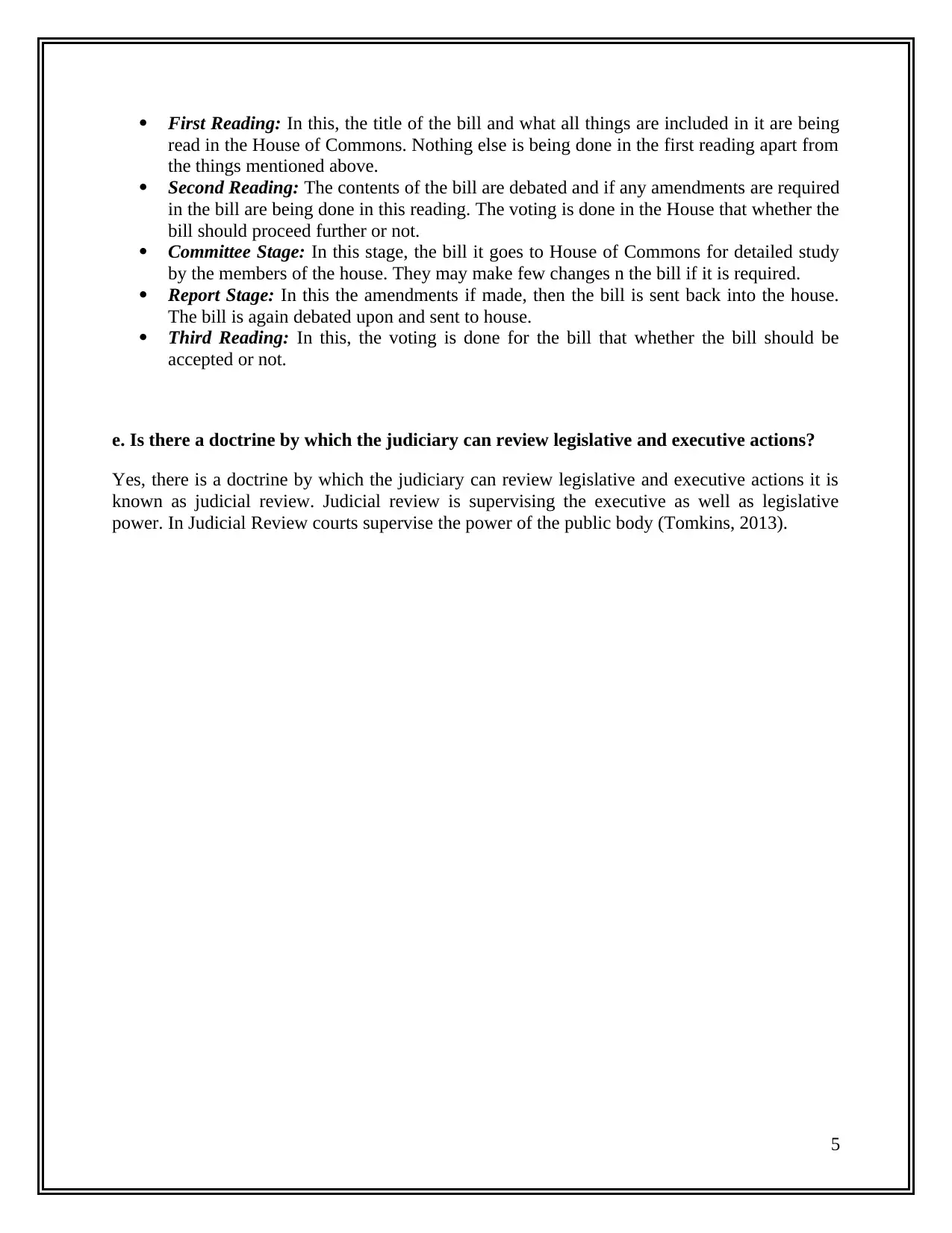
First Reading: In this, the title of the bill and what all things are included in it are being
read in the House of Commons. Nothing else is being done in the first reading apart from
the things mentioned above.
Second Reading: The contents of the bill are debated and if any amendments are required
in the bill are being done in this reading. The voting is done in the House that whether the
bill should proceed further or not.
Committee Stage: In this stage, the bill it goes to House of Commons for detailed study
by the members of the house. They may make few changes n the bill if it is required.
Report Stage: In this the amendments if made, then the bill is sent back into the house.
The bill is again debated upon and sent to house.
Third Reading: In this, the voting is done for the bill that whether the bill should be
accepted or not.
e. Is there a doctrine by which the judiciary can review legislative and executive actions?
Yes, there is a doctrine by which the judiciary can review legislative and executive actions it is
known as judicial review. Judicial review is supervising the executive as well as legislative
power. In Judicial Review courts supervise the power of the public body (Tomkins, 2013).
5
read in the House of Commons. Nothing else is being done in the first reading apart from
the things mentioned above.
Second Reading: The contents of the bill are debated and if any amendments are required
in the bill are being done in this reading. The voting is done in the House that whether the
bill should proceed further or not.
Committee Stage: In this stage, the bill it goes to House of Commons for detailed study
by the members of the house. They may make few changes n the bill if it is required.
Report Stage: In this the amendments if made, then the bill is sent back into the house.
The bill is again debated upon and sent to house.
Third Reading: In this, the voting is done for the bill that whether the bill should be
accepted or not.
e. Is there a doctrine by which the judiciary can review legislative and executive actions?
Yes, there is a doctrine by which the judiciary can review legislative and executive actions it is
known as judicial review. Judicial review is supervising the executive as well as legislative
power. In Judicial Review courts supervise the power of the public body (Tomkins, 2013).
5
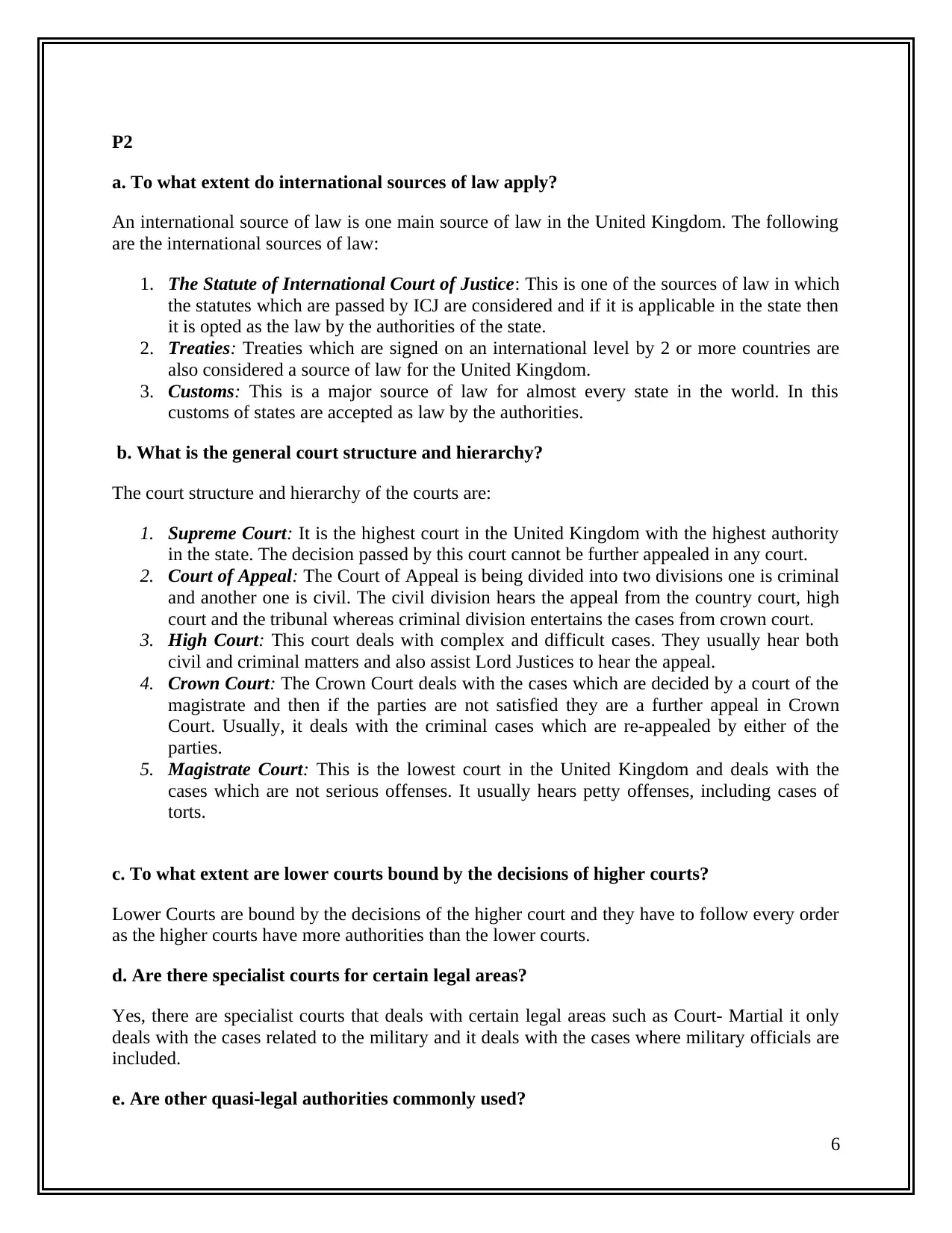
P2
a. To what extent do international sources of law apply?
An international source of law is one main source of law in the United Kingdom. The following
are the international sources of law:
1. The Statute of International Court of Justice: This is one of the sources of law in which
the statutes which are passed by ICJ are considered and if it is applicable in the state then
it is opted as the law by the authorities of the state.
2. Treaties: Treaties which are signed on an international level by 2 or more countries are
also considered a source of law for the United Kingdom.
3. Customs: This is a major source of law for almost every state in the world. In this
customs of states are accepted as law by the authorities.
b. What is the general court structure and hierarchy?
The court structure and hierarchy of the courts are:
1. Supreme Court: It is the highest court in the United Kingdom with the highest authority
in the state. The decision passed by this court cannot be further appealed in any court.
2. Court of Appeal: The Court of Appeal is being divided into two divisions one is criminal
and another one is civil. The civil division hears the appeal from the country court, high
court and the tribunal whereas criminal division entertains the cases from crown court.
3. High Court: This court deals with complex and difficult cases. They usually hear both
civil and criminal matters and also assist Lord Justices to hear the appeal.
4. Crown Court: The Crown Court deals with the cases which are decided by a court of the
magistrate and then if the parties are not satisfied they are a further appeal in Crown
Court. Usually, it deals with the criminal cases which are re-appealed by either of the
parties.
5. Magistrate Court: This is the lowest court in the United Kingdom and deals with the
cases which are not serious offenses. It usually hears petty offenses, including cases of
torts.
c. To what extent are lower courts bound by the decisions of higher courts?
Lower Courts are bound by the decisions of the higher court and they have to follow every order
as the higher courts have more authorities than the lower courts.
d. Are there specialist courts for certain legal areas?
Yes, there are specialist courts that deals with certain legal areas such as Court- Martial it only
deals with the cases related to the military and it deals with the cases where military officials are
included.
e. Are other quasi-legal authorities commonly used?
6
a. To what extent do international sources of law apply?
An international source of law is one main source of law in the United Kingdom. The following
are the international sources of law:
1. The Statute of International Court of Justice: This is one of the sources of law in which
the statutes which are passed by ICJ are considered and if it is applicable in the state then
it is opted as the law by the authorities of the state.
2. Treaties: Treaties which are signed on an international level by 2 or more countries are
also considered a source of law for the United Kingdom.
3. Customs: This is a major source of law for almost every state in the world. In this
customs of states are accepted as law by the authorities.
b. What is the general court structure and hierarchy?
The court structure and hierarchy of the courts are:
1. Supreme Court: It is the highest court in the United Kingdom with the highest authority
in the state. The decision passed by this court cannot be further appealed in any court.
2. Court of Appeal: The Court of Appeal is being divided into two divisions one is criminal
and another one is civil. The civil division hears the appeal from the country court, high
court and the tribunal whereas criminal division entertains the cases from crown court.
3. High Court: This court deals with complex and difficult cases. They usually hear both
civil and criminal matters and also assist Lord Justices to hear the appeal.
4. Crown Court: The Crown Court deals with the cases which are decided by a court of the
magistrate and then if the parties are not satisfied they are a further appeal in Crown
Court. Usually, it deals with the criminal cases which are re-appealed by either of the
parties.
5. Magistrate Court: This is the lowest court in the United Kingdom and deals with the
cases which are not serious offenses. It usually hears petty offenses, including cases of
torts.
c. To what extent are lower courts bound by the decisions of higher courts?
Lower Courts are bound by the decisions of the higher court and they have to follow every order
as the higher courts have more authorities than the lower courts.
d. Are there specialist courts for certain legal areas?
Yes, there are specialist courts that deals with certain legal areas such as Court- Martial it only
deals with the cases related to the military and it deals with the cases where military officials are
included.
e. Are other quasi-legal authorities commonly used?
6
⊘ This is a preview!⊘
Do you want full access?
Subscribe today to unlock all pages.

Trusted by 1+ million students worldwide
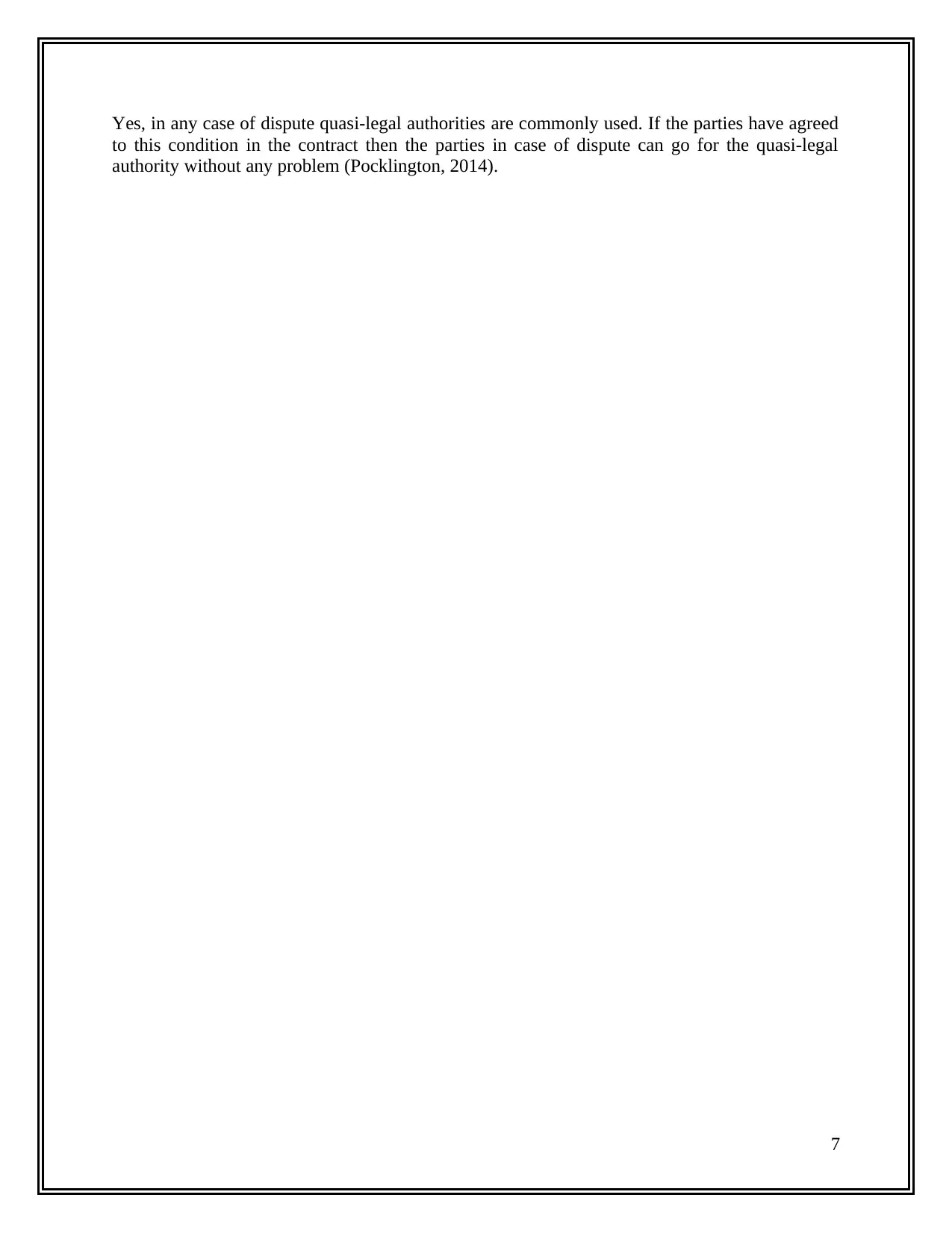
Yes, in any case of dispute quasi-legal authorities are commonly used. If the parties have agreed
to this condition in the contract then the parties in case of dispute can go for the quasi-legal
authority without any problem (Pocklington, 2014).
7
to this condition in the contract then the parties in case of dispute can go for the quasi-legal
authority without any problem (Pocklington, 2014).
7
Paraphrase This Document
Need a fresh take? Get an instant paraphrase of this document with our AI Paraphraser
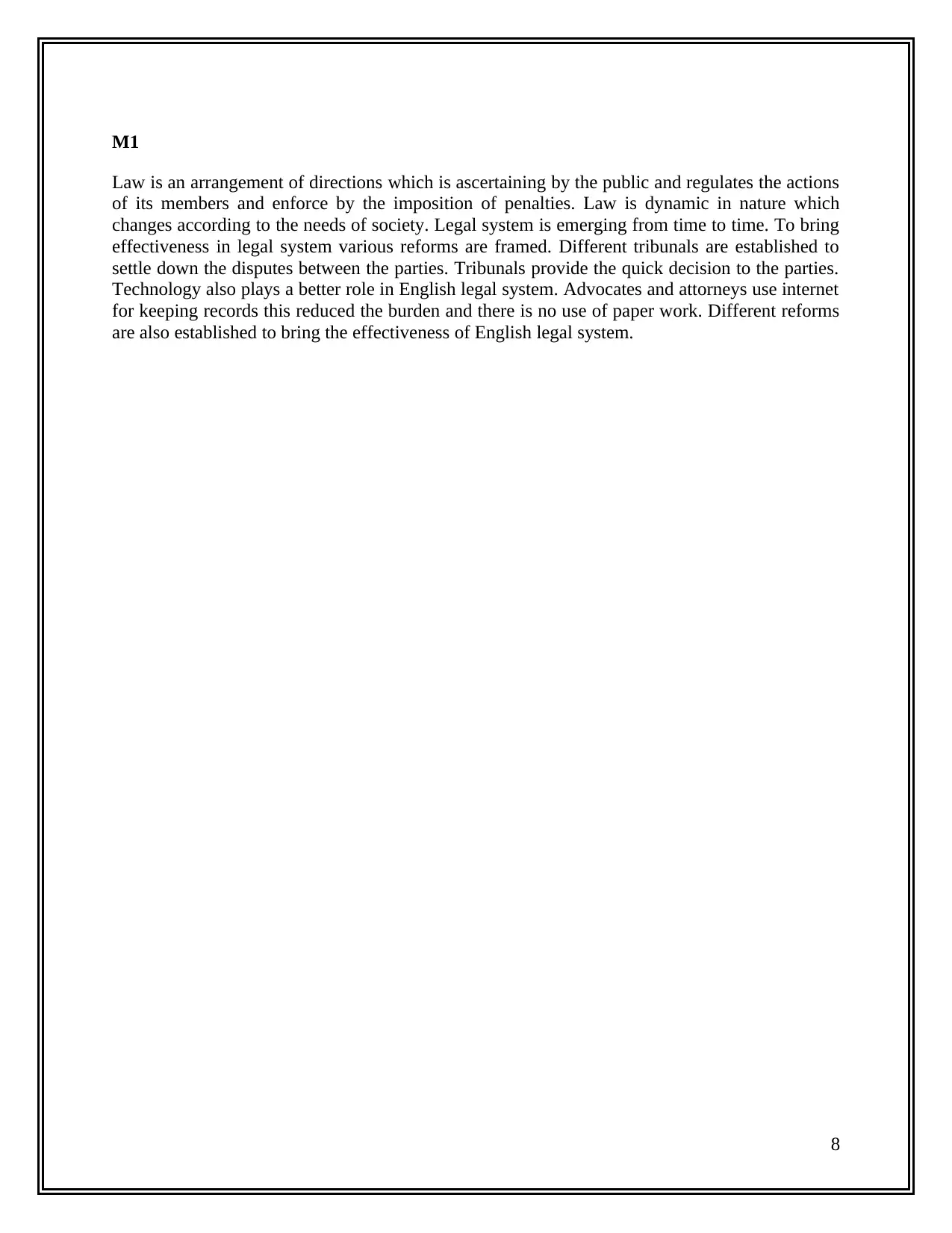
M1
Law is an arrangement of directions which is ascertaining by the public and regulates the actions
of its members and enforce by the imposition of penalties. Law is dynamic in nature which
changes according to the needs of society. Legal system is emerging from time to time. To bring
effectiveness in legal system various reforms are framed. Different tribunals are established to
settle down the disputes between the parties. Tribunals provide the quick decision to the parties.
Technology also plays a better role in English legal system. Advocates and attorneys use internet
for keeping records this reduced the burden and there is no use of paper work. Different reforms
are also established to bring the effectiveness of English legal system.
8
Law is an arrangement of directions which is ascertaining by the public and regulates the actions
of its members and enforce by the imposition of penalties. Law is dynamic in nature which
changes according to the needs of society. Legal system is emerging from time to time. To bring
effectiveness in legal system various reforms are framed. Different tribunals are established to
settle down the disputes between the parties. Tribunals provide the quick decision to the parties.
Technology also plays a better role in English legal system. Advocates and attorneys use internet
for keeping records this reduced the burden and there is no use of paper work. Different reforms
are also established to bring the effectiveness of English legal system.
8
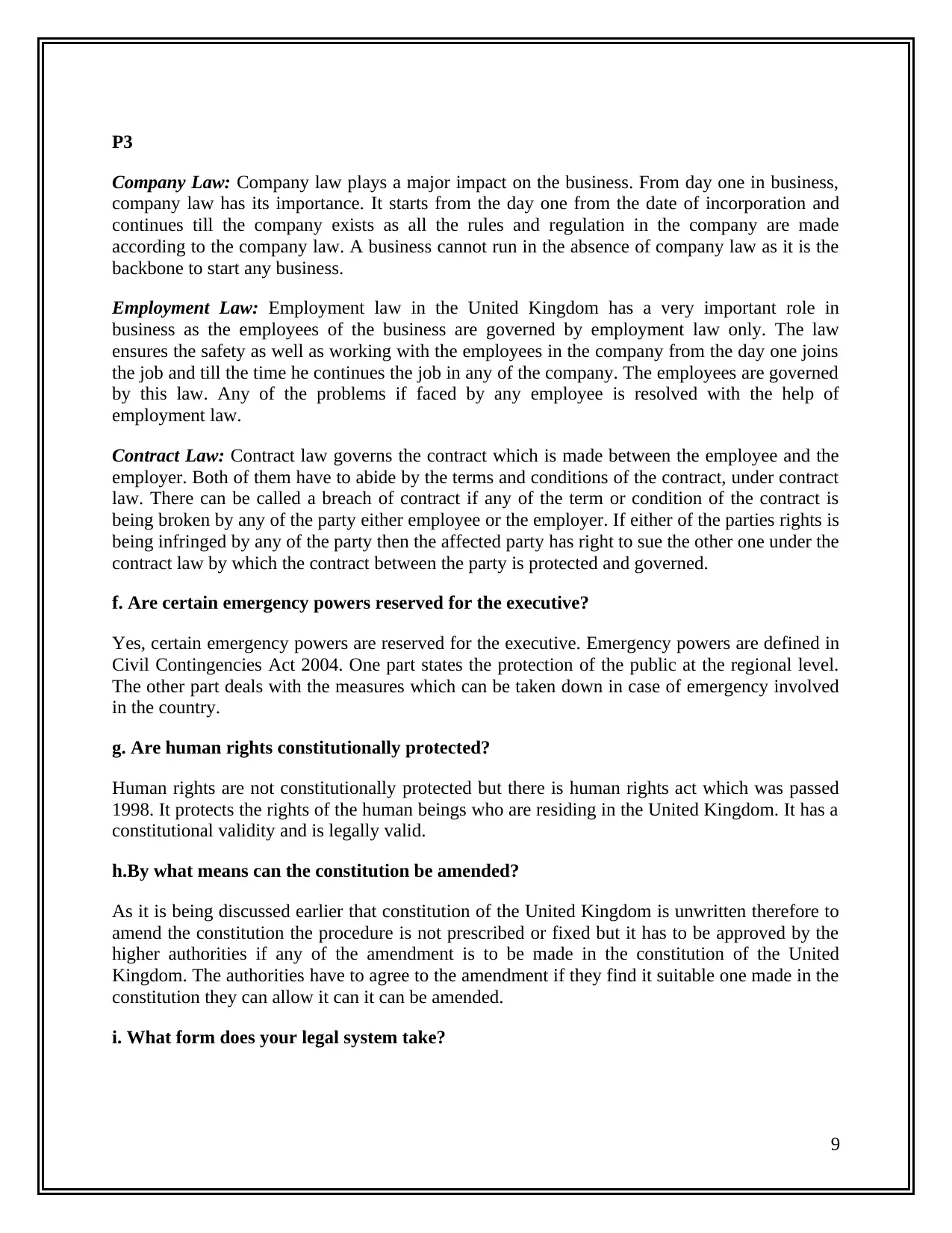
P3
Company Law: Company law plays a major impact on the business. From day one in business,
company law has its importance. It starts from the day one from the date of incorporation and
continues till the company exists as all the rules and regulation in the company are made
according to the company law. A business cannot run in the absence of company law as it is the
backbone to start any business.
Employment Law: Employment law in the United Kingdom has a very important role in
business as the employees of the business are governed by employment law only. The law
ensures the safety as well as working with the employees in the company from the day one joins
the job and till the time he continues the job in any of the company. The employees are governed
by this law. Any of the problems if faced by any employee is resolved with the help of
employment law.
Contract Law: Contract law governs the contract which is made between the employee and the
employer. Both of them have to abide by the terms and conditions of the contract, under contract
law. There can be called a breach of contract if any of the term or condition of the contract is
being broken by any of the party either employee or the employer. If either of the parties rights is
being infringed by any of the party then the affected party has right to sue the other one under the
contract law by which the contract between the party is protected and governed.
f. Are certain emergency powers reserved for the executive?
Yes, certain emergency powers are reserved for the executive. Emergency powers are defined in
Civil Contingencies Act 2004. One part states the protection of the public at the regional level.
The other part deals with the measures which can be taken down in case of emergency involved
in the country.
g. Are human rights constitutionally protected?
Human rights are not constitutionally protected but there is human rights act which was passed
1998. It protects the rights of the human beings who are residing in the United Kingdom. It has a
constitutional validity and is legally valid.
h.By what means can the constitution be amended?
As it is being discussed earlier that constitution of the United Kingdom is unwritten therefore to
amend the constitution the procedure is not prescribed or fixed but it has to be approved by the
higher authorities if any of the amendment is to be made in the constitution of the United
Kingdom. The authorities have to agree to the amendment if they find it suitable one made in the
constitution they can allow it can it can be amended.
i. What form does your legal system take?
9
Company Law: Company law plays a major impact on the business. From day one in business,
company law has its importance. It starts from the day one from the date of incorporation and
continues till the company exists as all the rules and regulation in the company are made
according to the company law. A business cannot run in the absence of company law as it is the
backbone to start any business.
Employment Law: Employment law in the United Kingdom has a very important role in
business as the employees of the business are governed by employment law only. The law
ensures the safety as well as working with the employees in the company from the day one joins
the job and till the time he continues the job in any of the company. The employees are governed
by this law. Any of the problems if faced by any employee is resolved with the help of
employment law.
Contract Law: Contract law governs the contract which is made between the employee and the
employer. Both of them have to abide by the terms and conditions of the contract, under contract
law. There can be called a breach of contract if any of the term or condition of the contract is
being broken by any of the party either employee or the employer. If either of the parties rights is
being infringed by any of the party then the affected party has right to sue the other one under the
contract law by which the contract between the party is protected and governed.
f. Are certain emergency powers reserved for the executive?
Yes, certain emergency powers are reserved for the executive. Emergency powers are defined in
Civil Contingencies Act 2004. One part states the protection of the public at the regional level.
The other part deals with the measures which can be taken down in case of emergency involved
in the country.
g. Are human rights constitutionally protected?
Human rights are not constitutionally protected but there is human rights act which was passed
1998. It protects the rights of the human beings who are residing in the United Kingdom. It has a
constitutional validity and is legally valid.
h.By what means can the constitution be amended?
As it is being discussed earlier that constitution of the United Kingdom is unwritten therefore to
amend the constitution the procedure is not prescribed or fixed but it has to be approved by the
higher authorities if any of the amendment is to be made in the constitution of the United
Kingdom. The authorities have to agree to the amendment if they find it suitable one made in the
constitution they can allow it can it can be amended.
i. What form does your legal system take?
9
⊘ This is a preview!⊘
Do you want full access?
Subscribe today to unlock all pages.

Trusted by 1+ million students worldwide
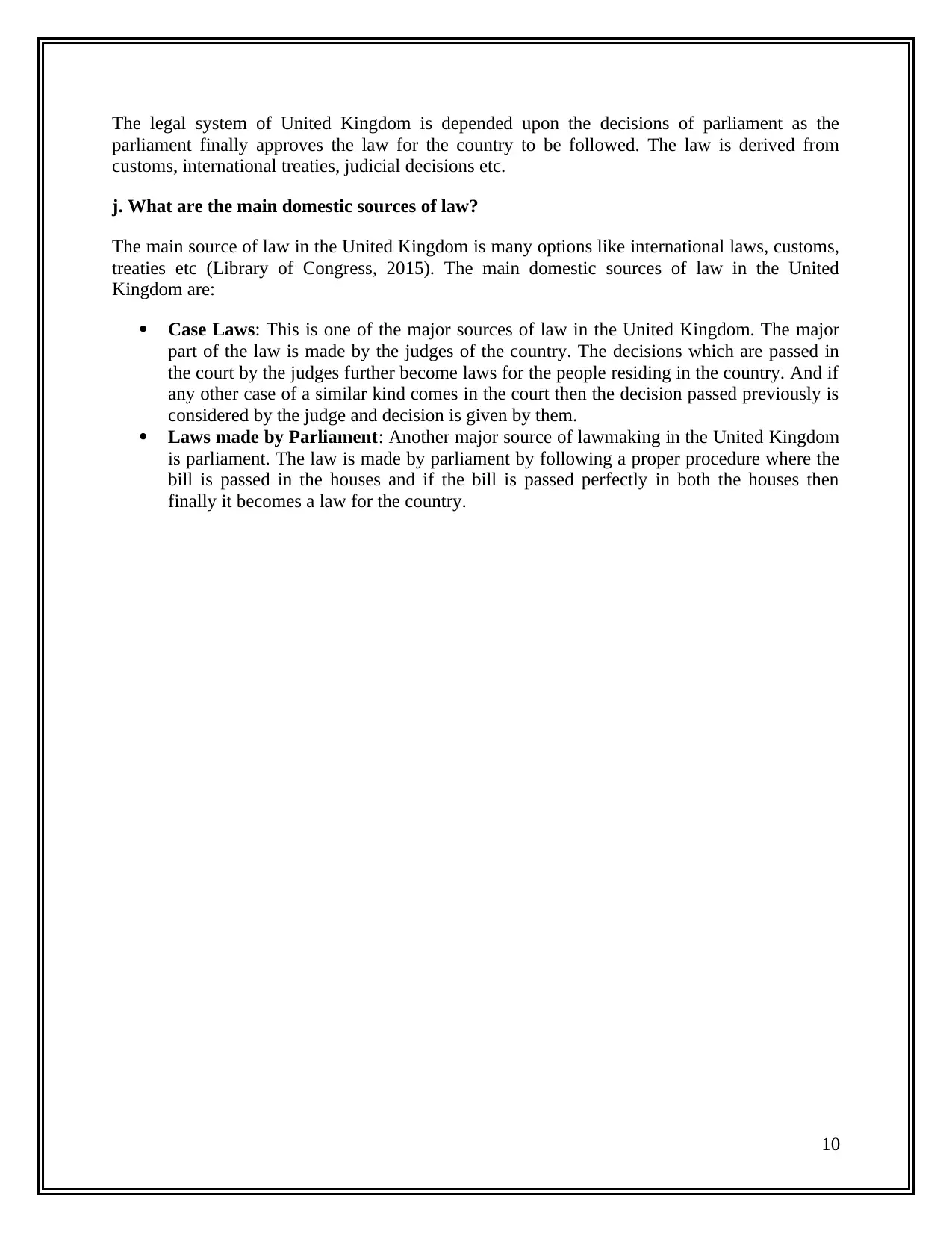
The legal system of United Kingdom is depended upon the decisions of parliament as the
parliament finally approves the law for the country to be followed. The law is derived from
customs, international treaties, judicial decisions etc.
j. What are the main domestic sources of law?
The main source of law in the United Kingdom is many options like international laws, customs,
treaties etc (Library of Congress, 2015). The main domestic sources of law in the United
Kingdom are:
Case Laws: This is one of the major sources of law in the United Kingdom. The major
part of the law is made by the judges of the country. The decisions which are passed in
the court by the judges further become laws for the people residing in the country. And if
any other case of a similar kind comes in the court then the decision passed previously is
considered by the judge and decision is given by them.
Laws made by Parliament: Another major source of lawmaking in the United Kingdom
is parliament. The law is made by parliament by following a proper procedure where the
bill is passed in the houses and if the bill is passed perfectly in both the houses then
finally it becomes a law for the country.
10
parliament finally approves the law for the country to be followed. The law is derived from
customs, international treaties, judicial decisions etc.
j. What are the main domestic sources of law?
The main source of law in the United Kingdom is many options like international laws, customs,
treaties etc (Library of Congress, 2015). The main domestic sources of law in the United
Kingdom are:
Case Laws: This is one of the major sources of law in the United Kingdom. The major
part of the law is made by the judges of the country. The decisions which are passed in
the court by the judges further become laws for the people residing in the country. And if
any other case of a similar kind comes in the court then the decision passed previously is
considered by the judge and decision is given by them.
Laws made by Parliament: Another major source of lawmaking in the United Kingdom
is parliament. The law is made by parliament by following a proper procedure where the
bill is passed in the houses and if the bill is passed perfectly in both the houses then
finally it becomes a law for the country.
10
Paraphrase This Document
Need a fresh take? Get an instant paraphrase of this document with our AI Paraphraser
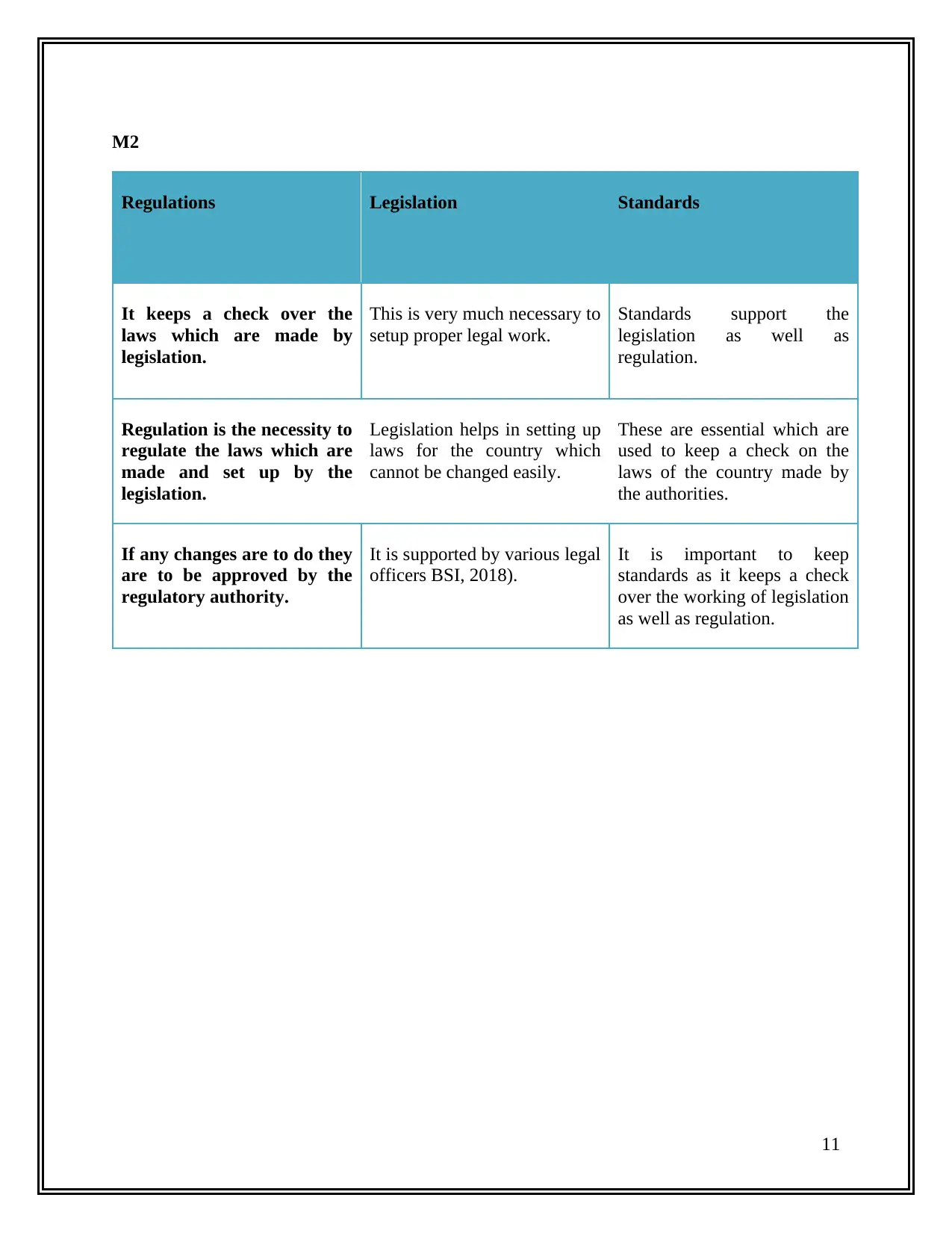
M2
Regulations Legislation Standards
It keeps a check over the
laws which are made by
legislation.
This is very much necessary to
setup proper legal work.
Standards support the
legislation as well as
regulation.
Regulation is the necessity to
regulate the laws which are
made and set up by the
legislation.
Legislation helps in setting up
laws for the country which
cannot be changed easily.
These are essential which are
used to keep a check on the
laws of the country made by
the authorities.
If any changes are to do they
are to be approved by the
regulatory authority.
It is supported by various legal
officers BSI, 2018).
It is important to keep
standards as it keeps a check
over the working of legislation
as well as regulation.
11
Regulations Legislation Standards
It keeps a check over the
laws which are made by
legislation.
This is very much necessary to
setup proper legal work.
Standards support the
legislation as well as
regulation.
Regulation is the necessity to
regulate the laws which are
made and set up by the
legislation.
Legislation helps in setting up
laws for the country which
cannot be changed easily.
These are essential which are
used to keep a check on the
laws of the country made by
the authorities.
If any changes are to do they
are to be approved by the
regulatory authority.
It is supported by various legal
officers BSI, 2018).
It is important to keep
standards as it keeps a check
over the working of legislation
as well as regulation.
11
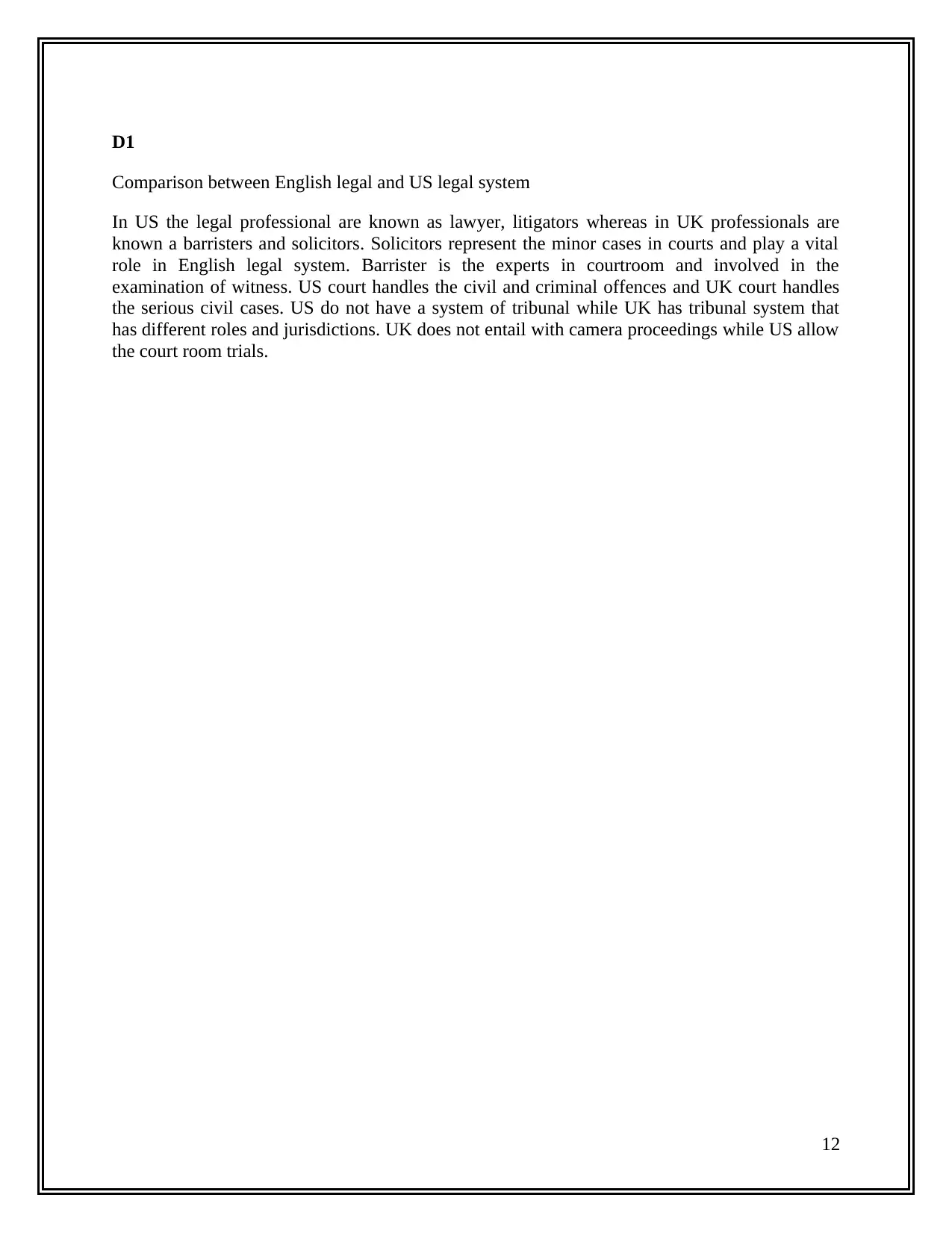
D1
Comparison between English legal and US legal system
In US the legal professional are known as lawyer, litigators whereas in UK professionals are
known a barristers and solicitors. Solicitors represent the minor cases in courts and play a vital
role in English legal system. Barrister is the experts in courtroom and involved in the
examination of witness. US court handles the civil and criminal offences and UK court handles
the serious civil cases. US do not have a system of tribunal while UK has tribunal system that
has different roles and jurisdictions. UK does not entail with camera proceedings while US allow
the court room trials.
12
Comparison between English legal and US legal system
In US the legal professional are known as lawyer, litigators whereas in UK professionals are
known a barristers and solicitors. Solicitors represent the minor cases in courts and play a vital
role in English legal system. Barrister is the experts in courtroom and involved in the
examination of witness. US court handles the civil and criminal offences and UK court handles
the serious civil cases. US do not have a system of tribunal while UK has tribunal system that
has different roles and jurisdictions. UK does not entail with camera proceedings while US allow
the court room trials.
12
⊘ This is a preview!⊘
Do you want full access?
Subscribe today to unlock all pages.

Trusted by 1+ million students worldwide
1 out of 21
Related Documents
Your All-in-One AI-Powered Toolkit for Academic Success.
+13062052269
info@desklib.com
Available 24*7 on WhatsApp / Email
![[object Object]](/_next/static/media/star-bottom.7253800d.svg)
Unlock your academic potential
Copyright © 2020–2026 A2Z Services. All Rights Reserved. Developed and managed by ZUCOL.





